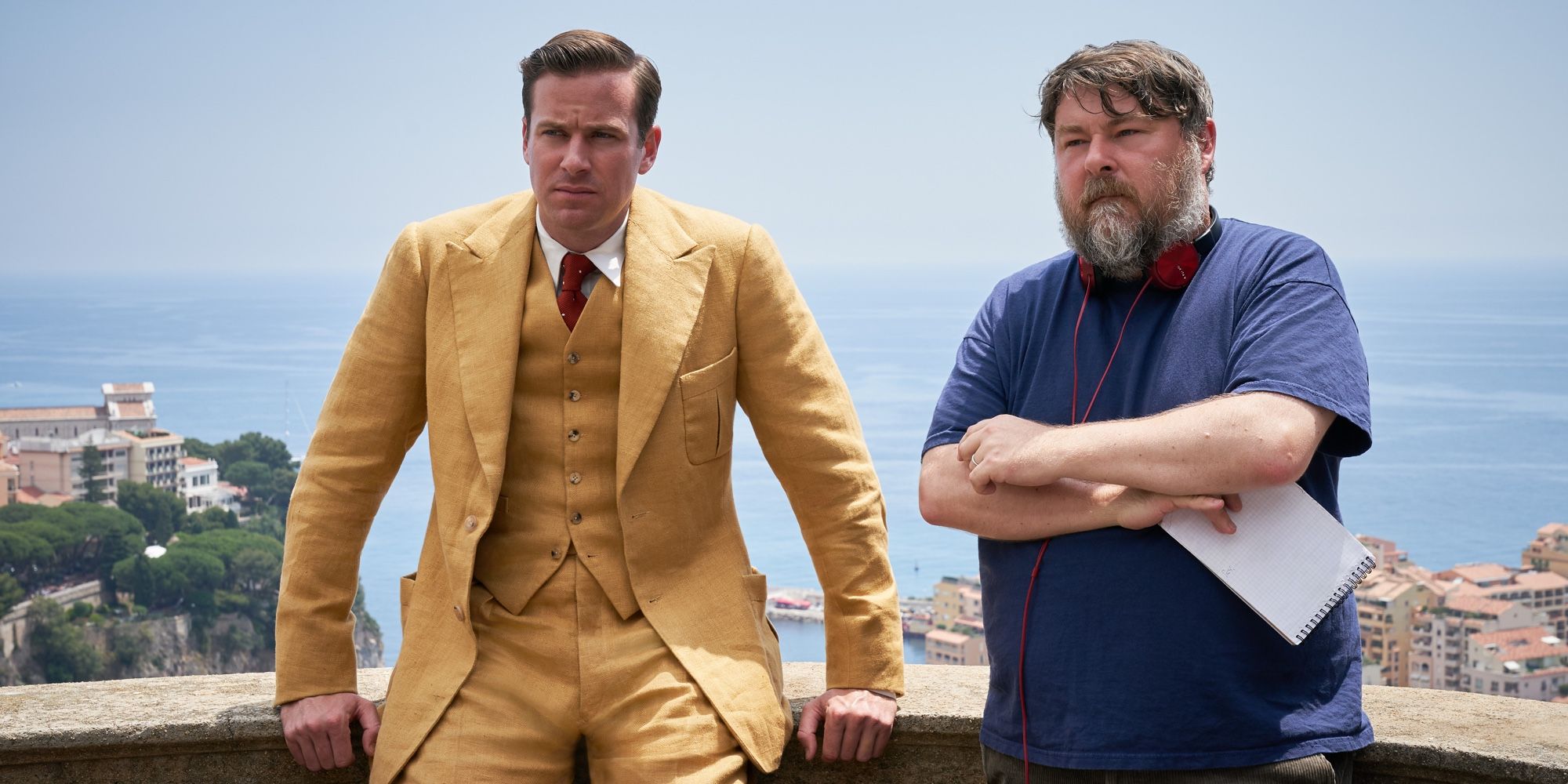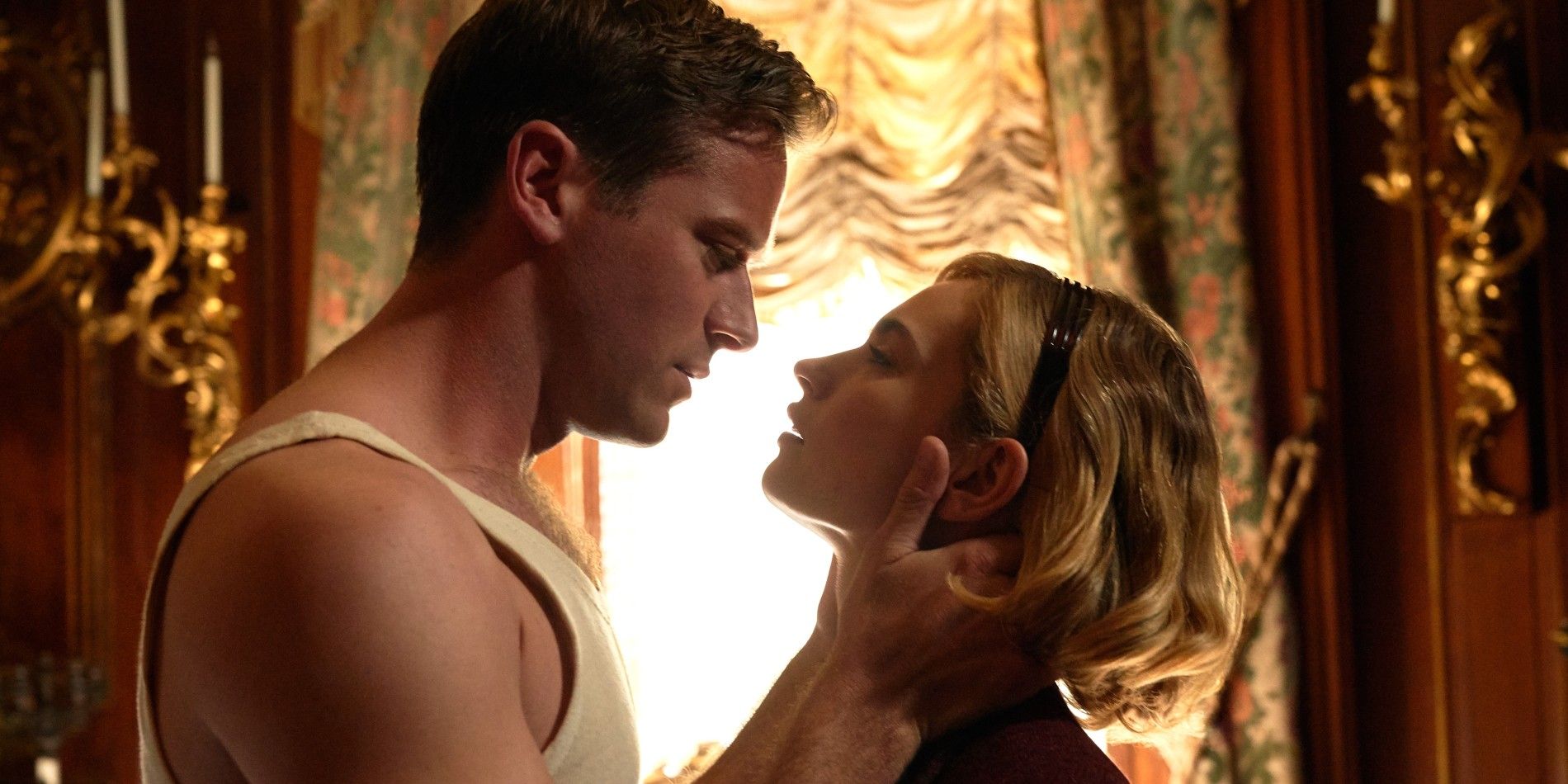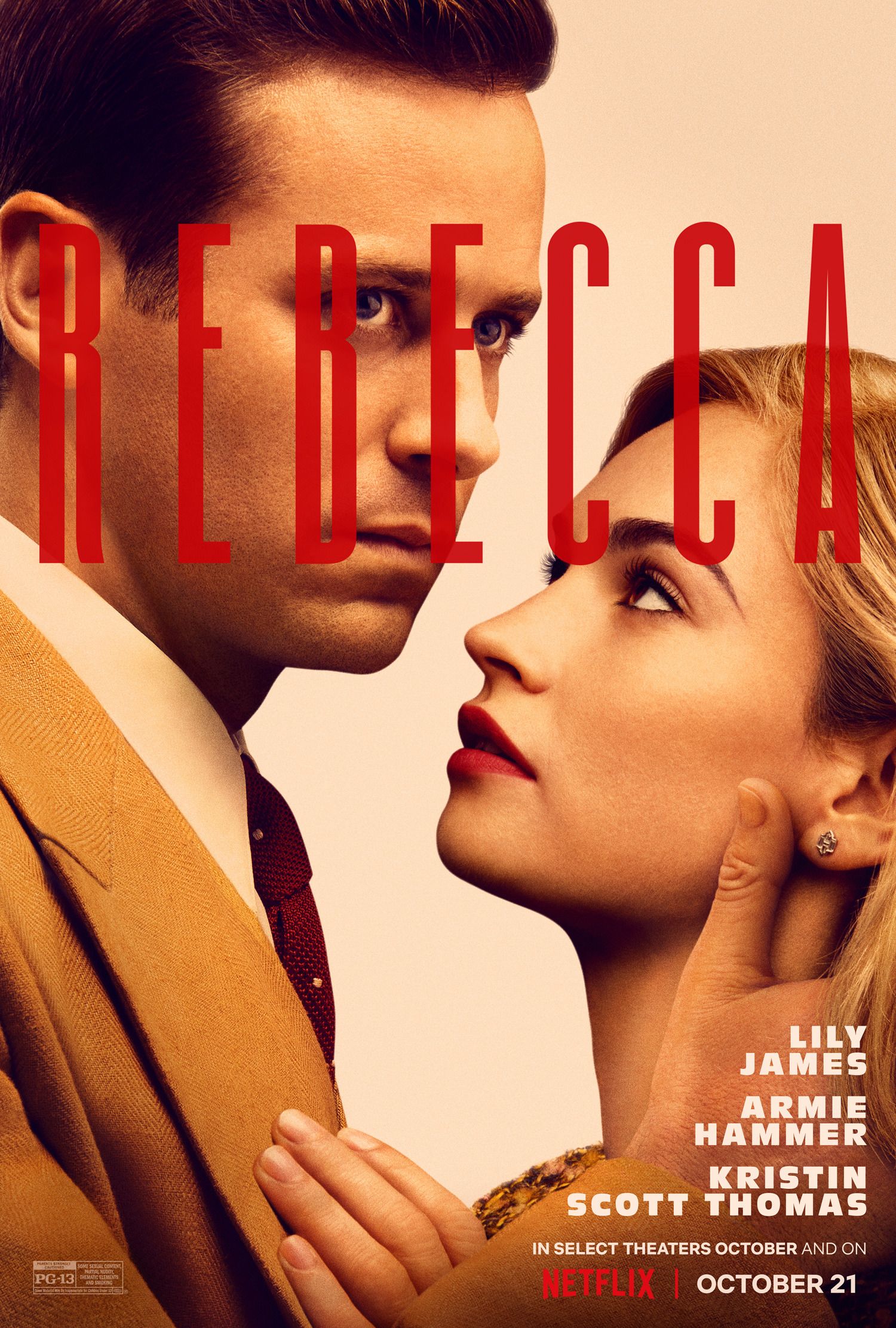Audiences everywhere will soon dream of going to Manderley again, when Netflix released its adaptation of the classic gothic novel Rebecca on October 21. Though it was famously adapted by Alfred Hitchcock in 1940, the tale of the second Mrs. de Winter and the ghost of the woman who once ruled the manor has been brought to the screen many times.
The latest director to take a stab at it is Ben Wheatley, and he has performances from the likes of Lily James, Armie Hammer, and Kristin Scott Thomas to rely on. He spoke to Screen Rant about the themes that drew him to the story and the painstaking editing process required to complete his vision of Rebecca.
The book, Rebecca, has been around a long time. Can you talk to me about some of your previous experiences with the book and what you remember from it?
Ben Wheatley: I read it at school, if I remember, originally. What I found that I really liked about it was this idea that there were so many different competing levels of reality. The whole thing in itself is, in the book and in the film, is not just a memory – it’s a memory of a dream.
So, how much of it do you believe? Where are these different perspectives and how much veracity do they have? The second Mrs. de Winter is remembering it, but she’s also reporting things that have been said to her by Maxim de Winter and by Mrs. Danvers. The ideas of what de Winter is saying, whether they’re true or not; whether what Danvers is saying is true or not; it’s really fascinating.
The other thing I really loved about it was the way that it was kind of a Russian doll of different genres just packed inside each other. [Daphne] du Maurier is kind of minxy in the way that she’s written a book that will jump from a romance to a haunting, and then into a courtroom drama and into a thriller.
But it’s also her just basically going, “Look, I know you like romances. Why don’t you read this? It’s got a guy, and he’s a widower. He’s a good-looking guy, and he meets this girl.” And then she goes, “Well, actually, I’m going to take that character and completely destroy it. I’ll make sure you never read a romance novel again in the same way, because he’s an absolute swine. He’s a murderer, and you’re still going to love him by the end of it. And then you’re going to be feeling guilty about that.”
This book is beloved by so many people, and it’s been around for quite a while with adaptations like Hitchcock’s film in 1940. Why is it the right time to introduce Rebecca to audiences again?
Ben Wheatley: One of the things I found about it was when I read the Jane Goldman adaptation, I started to fall for all the twists. I thought I knew it; I’d read the book and I’d seen the film, and I still fell for all the twists. And I felt like maybe I was misremembering it somehow. Rebecca itself has become part of the culture, but it’s one of those things where you go, “Yeah, I know it.” But do you know it?
One of the main things as well is that the Hitchcock version doesn’t have a major plot point that’s from the book. They couldn’t do because of the Hays Code at the time. When you don’t have that plot point, it completely changes the whole movie. So, when I read it in the script, that’s really when I thought, “This is the time to present it back to a new audience.”
But the other the other thing – the oddness of it – is that it is like a blueprint for all thrillers. You see it [jump off into] Patricia Highsmith and all those kinds of things. And the Mrs. Danvers character is a character that seems to crop up again and again, in different guises in different movies, and all those things. So, in a way, it’s like the modern and archetypal thriller – but at the same time, it has stuff in it that thrillers seemed to have not really dared to do, like have the main character be so villainous and still not get caught.
You have such a great grasp on psychological thrillers, but Rebecca is a little bit outside of your wheelhouse. What was it about the story that challenged you and motivated you to tackle the project?
Ben Wheatley: I mean, this is an interview question I get on every project, to be honest. Each film is as different as can be from the last one, so it’s “You do horror films, why are you doing a comedy?” or “You’ve done a comedy, why are you doing an action movie?” So, it’s not unusual.
What attracted me to it was to work in that register of romance and glamour, and having characters kiss each other and not punch each other. You know, I like that. Recently, I did a film called Happy New Year, Colin Burstead, which was the first movie I made where no one died. These are all bucket list things you’ve got to tick off. As much as I love horror – and I’ve just shot a 15 day grisly horror movie about two months ago, so it’s not like I’m not going back to that stuff – I think it’s important as a lover of cinema to exercise all these muscles.
The main characters are closer in age in the film, as opposed to the book. Why was that change made, and do you think that affects the viewing experience at all?
Ben Wheatley: I changed it, really, because I could probably live the rest of my life without seeing another film about an old man romancing a young woman. I felt like the naivety of the character and the difference in positions of privilege and power between the two, that hasn’t changed. Just the age is the only thing that’s different. I knew it was a controversial decision to make, but I just felt I’d seen it too much.

Armie Hammer is phenomenal in this; he has a lot of range and a lot of talent. What new side of the actor did you discover while making this film?
Ben Wheatley: I mean, I always knew. I’ve worked with him before on a film called Free Fire, which was two movies ago. I knew he had the chops to do it, and I knew he could do the breakdown and the weakness, which is a big bit of the acting. But the other side of it is that the matinee idol style and amazing good looks are important to the beginning of the movie, to make sure that you buy the romance and stuff. So, those are the two the two sides of it.
What did I discover about Armie? I don’t know if you’ve interviewed him or you’ve seen him interviewed, but he’s very relaxed and very self-deprecating. And it’s all an act. He’s completely a nervous wreck, and he’s also completely dedicated to his work and meticulous with his work. He’s like Dean Martin pretending to be drunk all the time. That’s the Armie Hammer shtick; don’t believe a word of it. He’s all like, “No, it’s no effort at all.” But it’s a massive amount of effort that goes into it, and it’s always great fun to watch him work.
Lily James gives another amazing performance. What did she bring to the role of Mrs. de Winter that maybe wasn’t necessarily on the page?
Ben Wheatley: I think with Lily, the managing of the nervousness and the anxiety was the massive part of the job. That’s something that we all sweated over, because if you go too far, then the character becomes very unlikable. And if you make the character too strong, then it breaks the structure of the book – she goes, “I’m a lawyer, and I’m leaving you!” That’s it, Rebecca is over.
I think that side of it was something that she was stressed about every day. And also, as with most movies, it wasn’t shot in chronological order. So, the tracking of her nervousness across the movie was always like – the schedule was like confetti in the air. We’re shooting one scene where she’s stronger, and one where she’s weaker, and all those kinds of things. So, she brought that kind of craft to the role.
I love watching Lily James and Kristin Scott Thomas onscreen together; their chemistry was extraordinary. Can you talk to me about the relationship between Mrs. de Winter and Mrs. Danvers?
Ben Wheatley: Yeah. I think that what was interesting in it, and that we kind of found through rehearsal and discussion, is the idea of whether the movie pivots away from what you expect of it, which is Danvers versus the second Mrs. de Winter. But there’s a moment where Danvers has started to understand the gravity of what’s happened, and they aren’t in competition. They’re not enemies, really. It’s her versus de Winter.
I thought that was really interesting to see that kind of that dynamic within the movie. It’s Danvers’ slow realization that she’s been duped – and duped on lots of different levels, not just by de Winter. She’s been living this lie; she’s been mourning for her friend Rebecca, but really she doesn’t know half of what’s happened, but also that she’s been duped by Rebecca herself, as in that she wasn’t told what happened about her illness and all those things. And the way that Kristin played that was amazing.
You shot this in the south of France, and the locations were stunning and beautiful. Can you talk about how some of those locations helped inform you as a director?
Ben Wheatley: Yeah. It was south of France, and it was shot back in the UK as well for the UK portion of it. But yeah, there was a lot of discussion about the south of France. Because obviously, it’s a big deal to go down. It’s expensive and really disruptive. So, if you go down there in the middle of summer and close those roads – the roads we shot on are the main roads in and out of Cannes, Nice and Monte Carlo. It’s quite a big job to shut those bits down, and everyone gets really cross. So, it was quite a stress.
We talked about it, and we go, “Oh, maybe we shoot somewhere else.” But there just isn’t anywhere else; there’s no way you could do it. And what you get when you shoot there is the instant glamour of it and the instant transporting. It does half of my direction and half of their acting, in a way, just to be there.
Certainly when we were shooting in the hotel, it was really interesting. Because again, you can’t close the hotel down to shoot for weeks on end in it at the height of summer, because it’s just a nightmare. There’s where all the money is, it would be so expensive. What we found was a hotel that had been turned into apartments, so we could completely control that. But when I was shooting there, we had hundreds of extras all in costume, and it was 360 degrees everywhere you looked. There was very minimal green screens and stuff. And it was just magic. It was like you had traveled in time.

What makes this film so effective is how it bends and shifts genres. What’s the key to balancing the tones, so that you can effectively pull the rug out from under the viewer?
Ben Wheatley: On a basic level, it’s just watching the film a lot and just really feeling it, and then just adjusting it and cutting it as a tasting. A lot of time was spent on that, and all this stuff hides in the frame. It’s not even in the seconds; it’s in the 24ths of the seconds – how long you’re looking at something, and how long does the sound come in to move you across from one thing to the other. So, that’s tricky.
There was a thing that Walter Murch said about editing, where a doctor finds a patient with a problem in the wrist, and it’s probably a problem in the shoulder. That’s a lot of the thing with editing, where you go, “This transition from this bit to this bit doesn’t work.” But the actual problem isn’t in that transition; it’s probably up the movie, 10 minutes the other way. Working that out is the big trick of it, and you can only do by watching the whole film. You change it once, and you have to watch the whole thing again and again.
Which is what we did. I think we had six months of watching the movie every day, or every couple of days. You have to load it all into your head in one go to understand how the place works. Which definitely convinces me to make much shorter films, you know.
The costume design and set design were phenomenal. Can you talk to me about the collaboration process with the designers?
Ben Wheatley: It was one of the big reasons I wanted to do the film, because of the period of it. I was very excited about that. And then Julian Day did the costume design on it. The conversation I would have had with him, in terms of direction, I’m all about just nudging rather than than telling. Because obviously, he’s got a lifetime experience of costume and you don’t want someone just rocking up like, “I’ve got loads of ideas about the 1930s that I’ve just read on Wikipedia.” He knows he knows exactly what he’s doing.
But my role in it is more talking about strategies and structure. We talked about how Maxim de Winters’ yellow or gold suit made him really pop out; made him the prize that she was trying to get. But then by the end of the film, she wears a golden suit as well, when she becomes their own prize. So, it’s stuff like that. No more specific than that, and then he would go get the costumes and sort that out.
That’s similar to Sarah Greenwood as well, on the art design front. There’s a lot of those kinds of conversations of like, how do we build Mandalay? How’s that constructed? And in the end, she decided that maybe we should build it from as many amazing houses in the UK as possible and cherry pick the best bits from all over the place, rather than shoot in one particular location.
Because the house in the book, Manderley, is not a real place. It just isn’t. It’s a place of dreams, in many ways. So, you’re never going to find that location and what you need it to be is much bigger scale than any one house. But the thing about British houses is a lot of them are a hodgepodge of styles anyway, so you get all those weird bits of architecture – you would start with a Tudor house, and then they’d build another house on top, and each generation would build another wing to it. So you would have twisty turny corridors and suddenly very diverse architecture.
Key Release Dates

Rebecca
Release Date:2020-10-21




